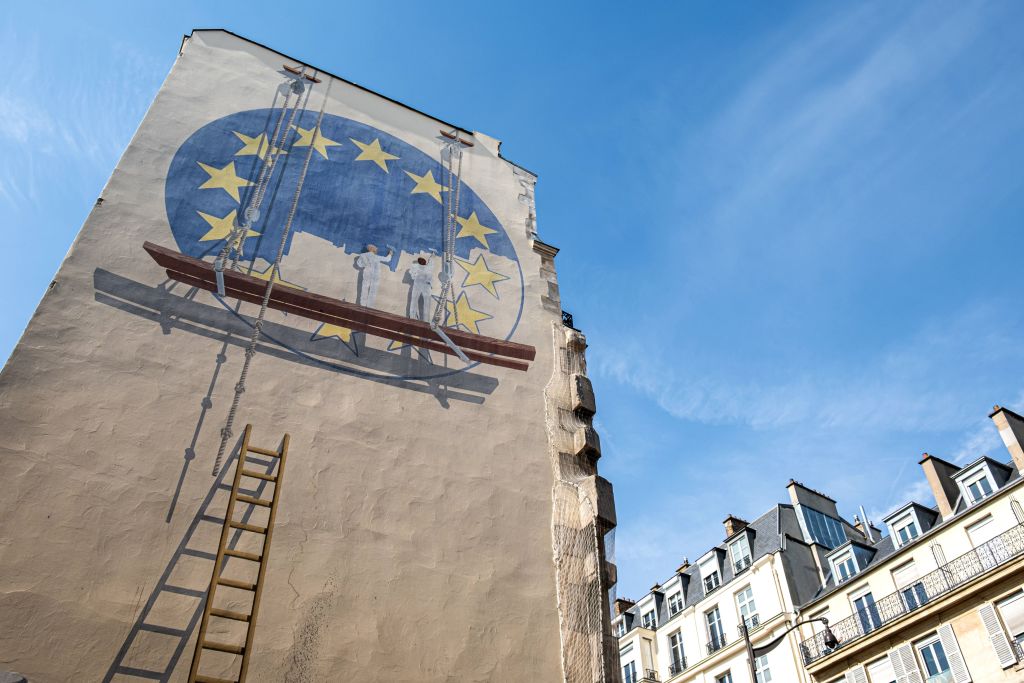Ursula von der Leyen has clung to an increasingly implausible narrative this week: that the EU made the ‘right decision’ with its vaccine strategy. It’s the clearest sign yet that Brussels is going into panic mode.
The Commission president is reported to have turned down requests to hold a public debate in the European parliament on the vaccine roll-out. Von der Leyen decided to only answer questions behind from a select group of MEPs behind closed doors. Finally, left without much choice the Commission president seems to have grudgingly accepted to appear before the European Parliament on Wednesday. The Commission feels increasingly cornered, and rightly so, for the EU’s vaccine struggle may well turn into an existential crisis.
The EU first responded to the vaccine crisis by lashing out, cracking down on AstraZeneca, imposing export controls and even threatening to introduce a hard border on Ireland. Now it appears to be in denial. In an interview, von der Leyen suggested that the UK has compromised on vaccine ‘safety and efficacy’. Similar remarks were made this week by the France’s Europe minister, Clement Beaune, who claimed that the British were taking ‘a lot of risks’ and that the EU had ‘nothing to envy’ from the UK and other countries.
If the UK can operate effectively as an independent state, what is the point of the EU’s sluggish and bureaucratic approach?
But Beaune and von der Leyen’s statements don’t make much sense. EU states have vaccinated a mere three per cent of their populations, compared to Britain’s 15 per cent, and there is no evidence to suggest the British have compromised on safety.
There is more at stake here for the EU than the roll-out of vaccines. To understand why, you only need to look at a speech by von der Leyen on 26 December, when the euphoric Commissioner boasted that the EU’s vaccination campaign would be a ‘touching moment of unity. And a European success story.’
The EU’s vaccine efforts were intended to reinforce the bloc’s importance and legitimise the Commission’s role. Specifically, this would emphasise the EU’s ability to avoid nationalism and prevent member states from fighting over vaccine supplies, thereby pushing up prices. That’s arguably why EU leaders agreed to centralise the vaccine programme in the first place. It was a responsibility the Commission was eager to assume.
That the EU’s vaccine strategy failed so completely is problematic enough for the Commission. But to make matters worse, the UK, which just left the EU, is doing so well. This calls into question the value of the EU and the Commission more generally. If the UK can operate effectively as an independent state, what is the point of the EU’s sluggish and bureaucratic approach?
In just a short period, many of the EU’s fundamental weaknesses have been laid bare, particularly its centralised policymaking and lack of accountability. The bloc – founded on the premise that it could overcome nationalism – even indulged in tit-for-tat nationalism of its own, threatening border restrictions and export controls to ensure vaccine supplies. Tellingly, this sabre-rattling even triggered a response from the WHO, which condemned the EU’s approach.
Viewed in this light, it is no surprise that, in my country, France, people are becoming increasingly concerned about the EU’s behaviour. We are the country of Louis Pasteur, renowned for his discoveries of the principles of vaccination. But we have already foolishly hobbled our own capacity to roll out the vaccine. The vaccine debacle underlines the fact that cooperation at the European level is not a viable alternative and could actually endanger France’s Covid-19 vaccination programme. Only arch EU-federalists like president Macron would disagree.
Given the doubts raised over the EU’s inadequate performance across the board, it is understandable that officials have started to panic. In any case, it seems inevitable that the bloc will have to undergo a radical transformation in order for it to serve the interests of its member states and their citizens.
Crises in the EU often grow to continent-wide proportions. This was the case with the migration crisis that contributed to Brexit. And it was true of the European debt crisis, from which many countries have still not recovered. The EU will now have to pull out all the stops if it wants to avoid yet another existential disaster.
Virginie Joron is a French MEP






Comments